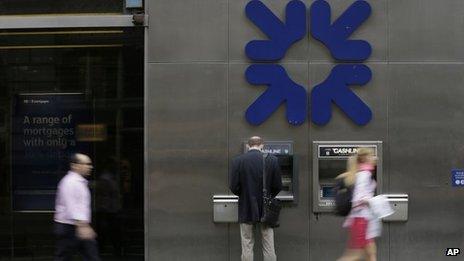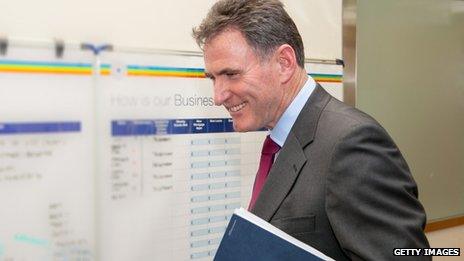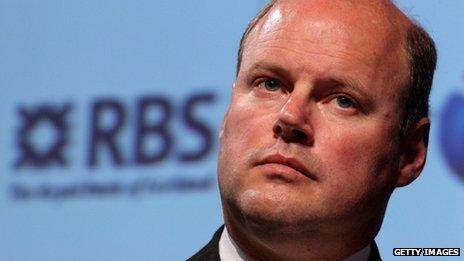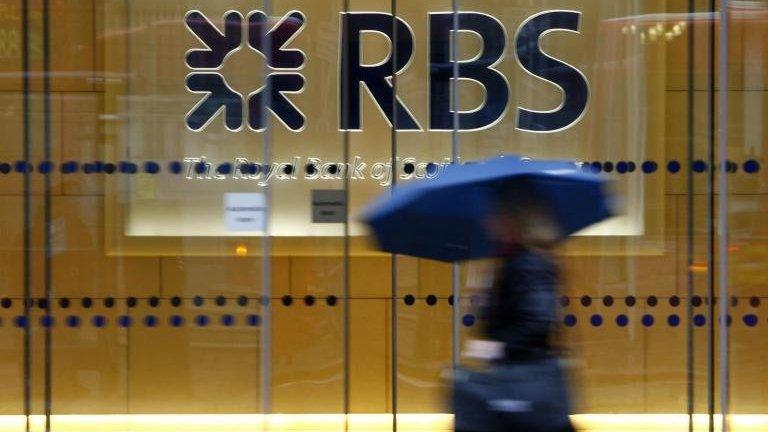Meet the new boss, listen to the old boss
- Published

There is a lot of focus on the new man taking over at the top of Royal Bank of Scotland. Understandably. The stakes make that appointment a big deal.
Ross McEwan arrives with the right kind of name to get the bank back to its ancestral roots, even if it has travelled via New Zealand. And he's got the right concentration on retail to get the bank to the retail focus the government wants.
As you'd expect, the chairman, the chancellor and the new appointee are all burbling their praise and approval of the appointment. This is not the time to reflect on the fact that it was hard to find an outsider willing to take on this poisoned political chalice.
There was praise and warm good wishes also from Stephen Hester, the departing chief executive. He can take credit for recruiting Ross McEwan from the Commonwealth Bank of Australia.
But rather than reflect on the praise and good wishes for the good man, it's worth a look at the final chief executive message that Mr Hester will deliver while announcing results.

Ross McEwan has been praised by his predecessor
A focus on the candid comments of the departing boss may tell you more than the focus on good wishes for the next one.
Hester will have his hands full until the October handover with an intensive process of working through which assets can be classified as 'good' and which are 'bad'. This is for the purposes of the Treasury-driven review of options for splitting the bank, in order to get the better bit of it back to private ownership on the stock exchange and in order to get it lending more.
But on that good/bad split, the half-year results come with an ominous warning to the Treasury. It says: "Any material proposal arising from the review, depending on its structure, may require approval by the group's board and by a majority of shareholders, excluding HM Treasury."
In other words, directors have a responsibility to the minority shareholders as well as the majority one. And it may be that the owners of the 19% stake not held by the government could hold a veto.
'Really good bank'
Stephen Hester's farewell statement needs a bit of reading between the lines. It's worth remembering, as you read it, that he disagreed with George Osborne on the change of strategy to a good/bad split, and on whether Hester was the right man to see through the sell-off of the government's stake.
"I will not talk here about future strategy, which is now for others to set," says Hester.
"But I will say this. My colleagues at RBS know what is needed to create a 'really good bank'. They want to do just that."

Stephen Hester says future success cannot be taken for granted
In other words, he IS talking about future strategy, and hinting that perhaps others don't know what is needed.
"This will require time, tools to do the job, clarity and consistency of direction and yes, some luck too."
Stephen Hester didn't have much luck with the problems afflicting the wider economy, and with other factors delaying or frustrating his recovery plan.
Clarity and consistency of direction seem to be missing now, though, and 'tools to do the job' might just include the freedom to manage without interference.
Blank sheet
"RBS half-year results show the huge progress since 2008," continues Hester. "They also highlight the challenges left. While completing capital build and loss elimination looks wholly achievable, the bank needs some time to finish these tasks".
That's just what the political timetable, aimed at the 2015 election, has denied Mr Hester.
"More importantly," the chief executive goes on, "future success in the ongoing business cannot be taken for granted. It will need to be worked at.
"RBS's business mix is vastly changed, but inevitably a product of what was practical to achieve rather than starting from a blank sheet of paper.
"And the challenges of restructuring have had different consequences across the business. For all banks, legacy conduct and litigation costs also seem likely to remain features for some time."
That final sentence is a warning to his successor. And the manner of Stephen Hester's departure highlights the fact that Ross McEwan will have to be good at politics.
Legacy issues
Business Secretary Vince Cable is among those on his case to boost business lending.
There's mixed news on that with the half-year figures. RBS is reporting an 8% increase in applications for SME loan and overdraft applications in the first half of the year.
But leaving aside the troubled commercial property sector, loans and advances were down. Companies are still hoarding cash. SME deposits were up £2.1bn to £57bn, and companies are using only 42% of their overdraft facilities, down from 47% at the end of last year.
The other legacy issues that will surely dog Ross McEwan's progress include legal challenges and regulatory inquiries costing £620m in the first half of the year, with £385m newly set aside.
They're not over the cost of mis-selling payment protection insurance. There's another £185m put aside, taking the total to £2.4bn.
The messiest issue could yet be the shareholder legal action against the bank and some former directors, over the basis on which the bank successfully sought £12bn in a rights issue, months before it collapsed.
- Published2 August 2013
